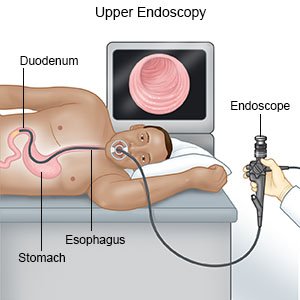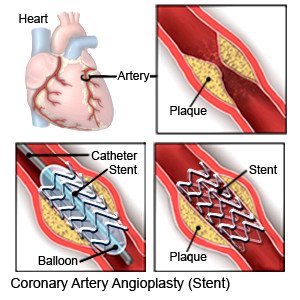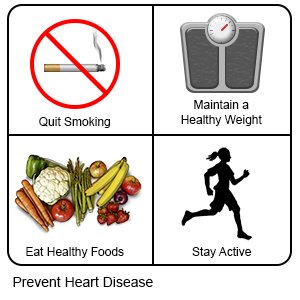Chest Pain
Medically reviewed by Drugs.com. Last updated on Apr 6, 2025.
What do I need to know about chest pain?
Chest pain can be caused by a range of conditions, from not serious to life-threatening. It is important to follow up with your healthcare provider to find the cause of your chest pain.
What may cause or increase my risk for chest pain?
- A digestion problem, such as acid reflux or a stomach ulcer
- An anxiety attack or a strong emotion, such as anger
- Infection, inflammation, or a fracture in the bones or cartilage in your chest
- Poor blood flow to your heart (angina)
- A life-threatening condition, such as a heart attack or blood clot in your lungs
What other symptoms might I have with chest pain?
- A burning feeling behind your breastbone
- A racing or slow heartbeat
- Fever or sweating
- Nausea or vomiting
- Shortness of breath
- Discomfort or pressure that spreads from your chest to your back, jaw, or arm
- Feeling weak, tired, or faint
How is the cause of chest pain diagnosed?
Your healthcare provider will examine you. Describe your chest pain in as much detail as possible. Tell him or her where your pain is and when it began. Tell the provider if you notice anything that makes the pain worse or better. Tell him or her if it is constant or comes and goes. Also include any other symptoms you have with the chest pain, such as sweating or nausea. Your provider will ask about any medicines you use and medical conditions you have. Tell him or her if you have a family history of heart disease. You may also need any of the following tests:
- An EKG is a test that records your heart's electrical activity.
- Blood tests check for heart damage and signs of a heart attack.
- An echocardiogram uses sound waves to see if blood is flowing normally through your heart.
- An ultrasound, x-ray, CT, or MRI scan may show the cause of your chest pain. You may be given contrast liquid to help your heart show up better in the pictures. Tell the healthcare provider if you have ever had an allergic reaction to contrast liquid. Do not enter the MRI room with anything metal. Metal can cause serious injury. Tell the provider if you have any metal in or on your body.
- An endoscopy may be done to check for ulcers or problem with your esophagus.

Drugs used to treat this and similar conditions
Ranexa
Ranexa (ranolazine) is used to chronic treat angina (chest pain). Learn about side effects ...
Nitrostat
Nitrostat (nitroglycerin) is used to treat a type of chest pain called angina. Includes Nitrostat ...
Omvoh
Omvoh is used to treat moderate to severe ulcerative colitis or Crohn's disease in adults. This ...
Amlodipine
Amlodipine is a calcium channel blocker used to treat high blood pressure and angina by relaxing ...
Isosorbide mononitrate
Isosorbide mononitrate is used to prevent angina attacks (chest pain) by dilating blood vessels ...
Metoprolol
Metoprolol is used to treat angina (chest pain) and hypertension (high blood pressure). Learn about ...
Carvedilol
Carvedilol (Coreg) is used to treat heart failure and hypertension (high blood pressure). Includes ...
Isosorbide dinitrate
Isosorbide dinitrate systemic is used for angina, angina pectoris prophylaxis, esophageal spasm ...
How is chest pain treated?
- Medicines may be given to treat the cause of your chest pain. Examples include pain medicine, anxiety medicine, or medicines to increase blood flow to your heart. Do not take certain medicines without asking your healthcare provider first. These include NSAIDs, herbal or vitamin supplements, and hormones, such as estrogen or progestin.
- A stent may be placed if your chest pain is caused by blockage in your heart. A stent is a wire mesh tube that helps hold your artery open. You may need more than 1 stent.

What are some healthy living tips?
If the cause of your chest pain is known, your healthcare provider will give you specific guidelines to follow. The following are general healthy guidelines:
- Do not smoke. Nicotine and other chemicals in cigarettes and cigars can cause lung and heart damage. Ask your healthcare provider for information if you currently smoke and need help to quit. E-cigarettes or smokeless tobacco still contain nicotine. Talk to your healthcare provider before you use these products.
- Choose a variety of healthy foods as often as possible. Include fresh, frozen, or canned fruits and vegetables. Also include low-fat dairy products, fish, chicken (without skin), and lean meats. Your healthcare provider or a dietitian can help you create meal plans. You may need to avoid certain foods or drinks if your pain is caused by a digestion problem.

- Lower your sodium (salt) intake. Limit foods that are high in sodium, such as canned foods, salty snacks, and cold cuts. If you add salt when you cook food, do not add more at the table. Choose low-sodium canned foods as much as possible.

- Drink plenty of water every day. Water helps your body to control your temperature and blood pressure. Ask your healthcare provider how much water you should drink every day.
- Ask about activity. Your healthcare provider will tell you which activities to limit or avoid. Ask when you can drive, return to work, and have sex. Ask about the best exercise plan for you.
- Maintain a healthy weight. Ask your healthcare provider what a healthy weight is for you. Ask him or her to help you create a weight loss plan if you are overweight.
- Ask about vaccines you may need. Your healthcare provider can tell you which vaccines you need, and when to get them. The following vaccines help prevent diseases that can become serious for a person with a heart condition:
- The influenza (flu) vaccine is given each year. Get a flu vaccine as soon as recommended, usually in September or October.
- The pneumonia vaccine is usually given every 5 years. Your healthcare provider may recommend the pneumonia vaccine if you are 65 or older.
- COVID-19 vaccines are given to adults as a shot. At least 1 dose of an updated vaccine is recommended for all adults. COVID-19 vaccines are updated throughout the year. Adults 65 or older need a second dose of updated vaccine at least 4 months after the first dose. Your healthcare provider can help you schedule all needed doses as updated vaccines become available.
 |
Call your local emergency number (911 in the US) or have someone call if:
- You have any of the following signs of a heart attack:
- Squeezing, pressure, or pain in your chest
- You may also have any of the following:
- Discomfort or pain in your back, neck, jaw, stomach, or arm
- Shortness of breath
- Nausea or vomiting
- Lightheadedness or a sudden cold sweat
When should I seek immediate care?
- You have chest discomfort that gets worse, even with medicine.
- You cough or vomit blood.
- Your bowel movements are black or bloody.
- You cannot stop vomiting, or it hurts to swallow.
When should I call my doctor?
- You have questions or concerns about your condition or care.
Care Agreement
You have the right to help plan your care. Learn about your health condition and how it may be treated. Discuss treatment options with your healthcare providers to decide what care you want to receive. You always have the right to refuse treatment. The above information is an educational aid only. It is not intended as medical advice for individual conditions or treatments. Talk to your doctor, nurse or pharmacist before following any medical regimen to see if it is safe and effective for you.© Copyright Merative 2025 Information is for End User's use only and may not be sold, redistributed or otherwise used for commercial purposes.
Learn more about Chest Pain
Care guides
Further information
Always consult your healthcare provider to ensure the information displayed on this page applies to your personal circumstances.
